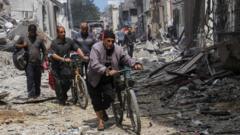In Kinshasa, the capital of the Democratic Republic of Congo, relentless rains have led to catastrophic flooding, resulting in dozens of deaths and widespread destruction. Recent reports indicate that at least 33 people have lost their lives as the Ndjili River overflowed, inundating homes and critical infrastructure, including Lumumba Boulevard, a primary route to the airport. As the floods recede, government officials anticipate the death toll may rise, and thousands have been displaced.
Tragedy Strikes Kinshasa: Floods Claim Lives Amid Humanitarian Crisis

Tragedy Strikes Kinshasa: Floods Claim Lives Amid Humanitarian Crisis
Devastating floods in the capital city of the Democratic Republic of Congo signal a dual crisis in the region, where humanitarian challenges meet climate-induced disasters.
The floods have exacerbated an already dire humanitarian situation in the DRC, which is grappling with a resurgence of conflict in its eastern provinces. Earlier this year, violence from rebel offensives displaced nearly seven million people, compounding the challenges posed by the recent flooding. The United Nations has noted that significant international aid was directed towards the DRC in 2024, with the U.S. alone contributing $910 million for food and emergency services. However, a recent reduction in foreign assistance threatens to jeopardize ongoing aid efforts to the most vulnerable populations.
Noteworthy is President Felix Tshisekedi's visit to affected regions, where he highlighted the contribution of illegal settlements to the overwhelming damage. The informal housing structures built on steep hillsides lack appropriate drainage, making them particularly susceptible to flooding. Families like that of Denise Sukali now face an uncertain future, as they seek refuge in churches and community facilities while their homes remain submerged.
Across Africa, the increasing frequency of deadly weather events has led scientists to attribute these incidents to climate change. Congo's trajectory of floods has been alarming, with hundreds losing their lives annually over the past few years. International observers continue to call for urgent measures to address not only the immediate consequences of such disasters but also the underlying vulnerabilities exacerbated by rapid urbanization and conflict.
Despite the despair, the resilience shown by many Kinshasa residents underscores the profound strength of communities facing overwhelming adversity. The latest flood crisis reiterates the urgent need for comprehensive approaches to enhance disaster preparedness, improve urban planning, and tackle the IT and underlying humanitarian challenges faced by the Congolese people.
As the situation unfolds, priorities remain focused on recovery and support for those impacted, ensuring that the voices of the affected communities are amplified in conversations about restoration and resilience for Kinshasa's future.
Noteworthy is President Felix Tshisekedi's visit to affected regions, where he highlighted the contribution of illegal settlements to the overwhelming damage. The informal housing structures built on steep hillsides lack appropriate drainage, making them particularly susceptible to flooding. Families like that of Denise Sukali now face an uncertain future, as they seek refuge in churches and community facilities while their homes remain submerged.
Across Africa, the increasing frequency of deadly weather events has led scientists to attribute these incidents to climate change. Congo's trajectory of floods has been alarming, with hundreds losing their lives annually over the past few years. International observers continue to call for urgent measures to address not only the immediate consequences of such disasters but also the underlying vulnerabilities exacerbated by rapid urbanization and conflict.
Despite the despair, the resilience shown by many Kinshasa residents underscores the profound strength of communities facing overwhelming adversity. The latest flood crisis reiterates the urgent need for comprehensive approaches to enhance disaster preparedness, improve urban planning, and tackle the IT and underlying humanitarian challenges faced by the Congolese people.
As the situation unfolds, priorities remain focused on recovery and support for those impacted, ensuring that the voices of the affected communities are amplified in conversations about restoration and resilience for Kinshasa's future.




















